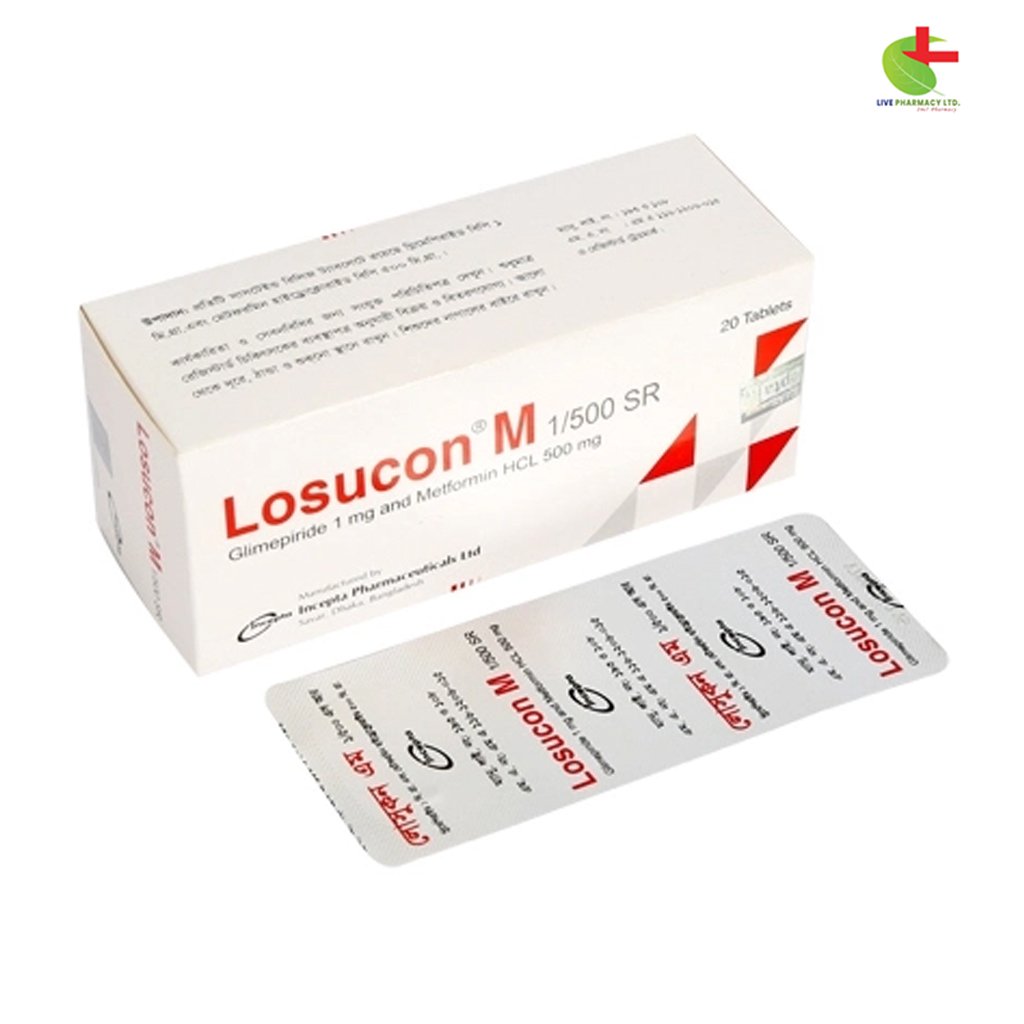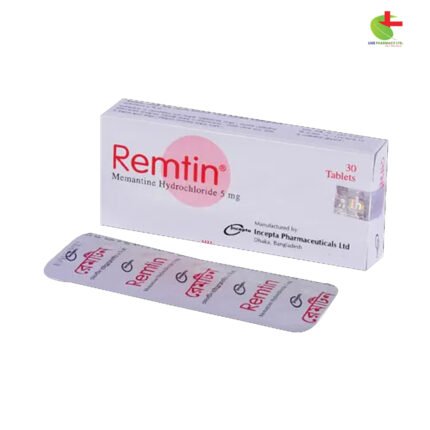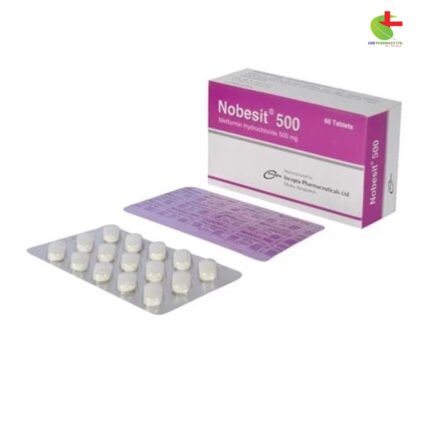Losucon M 1 SR
90.00৳ Strip
- Losucon M Tablets are designed for managing type 2 diabetes mellitus.
- Combines glimepiride and metformin to enhance blood sugar control alongside diet and exercise.
- Stimulates insulin release and improves insulin sensitivity while lowering glucose production.
- Follow a healthcare professional’s guidance for dosage and administration to ensure optimal results.
- Minimize the risk of hypoglycemia through careful monitoring.
 Brand
Brand
|
Incepta Pharmaceuticals Ltd |
|---|---|
 Generics
Generics
|
Glimepiride + Metformin |
 Type
Type
|
Tablet |
Indications
Losucon M Tablets are designed to support diet and exercise in patients with type 2 diabetes mellitus, specifically:
- When monotherapy with glimepiride or metformin does not achieve adequate blood sugar control.
- As a replacement for the combined use of glimepiride and metformin.
Always consult a registered healthcare professional before use.
Pharmacology
Glimepiride, a sulfonylurea antidiabetic, effectively lowers blood glucose levels. Its primary action is to stimulate insulin release from functioning pancreatic beta cells, enhancing their sensitivity to glucose. Additionally, glimepiride may decrease liver glucose production and improve insulin sensitivity, facilitating glucose uptake in peripheral tissues. In non-fasting diabetic patients, the hypoglycemic effects of glimepiride can last for up to 24 hours.
Metformin Hydrochloride is an oral antihyperglycemic agent from the biguanide class, used primarily in managing type 2 diabetes. It lowers both fasting and post-meal glucose levels without causing hypoglycemia. Metformin works by reducing hepatic glucose production, decreasing intestinal glucose absorption, and enhancing insulin sensitivity through increased peripheral glucose uptake.
Dosage
- Dosage should be tailored to the individual’s blood glucose levels, with the lowest effective dose recommended for optimal metabolic control. Regular monitoring of blood glucose in blood and urine is essential during treatment.
- Missed doses should not be compensated by taking larger doses later.
- As diabetes control improves, the need for glimepiride may decrease, necessitating timely dose adjustments to avoid hypoglycemia.
- The maximum daily dosage should not exceed 8 mg of glimepiride and 2000 mg of metformin.
- When transitioning from separate glimepiride and metformin tablets, dosage should be based on current intake.
Always follow the advice of a registered healthcare professional.
Administration
Swallow the tablet whole; do not crush or chew.
Always consult a registered healthcare professional before use.
Interactions
For Glimepiride:
- Metabolized by CYP2C9; caution is needed when co-administered with CYP2C9 inducers (e.g., rifampicin) or inhibitors (e.g., fluconazole).
- Increased risk of hypoglycemia may occur with certain drugs such as insulin and other oral antidiabetics.
- Some medications can decrease the blood-glucose-lowering effect, leading to elevated glucose levels.
For Metformin:
- Concurrent alcohol use increases the risk of lactic acidosis, especially during fasting or if renal function is compromised.
- Certain medications can adversely affect renal function or interact with metformin; close monitoring of renal status is crucial.
Contraindications
For Glimepiride:
- Hypersensitivity to glimepiride, metformin, sulfonylureas, or any component of the formulation.
- Not recommended for pregnant or breastfeeding women.
For Metformin:
- Contraindicated in cases of hypersensitivity, acute metabolic acidosis, severe renal failure, and conditions that can impair renal function.
Side Effects
For Glimepiride:
- Risk of hypoglycemia, especially in initial treatment phases.
- Temporary visual disturbances may occur due to fluctuating blood glucose levels.
- Gastrointestinal symptoms, hepatic issues, and possible hematological disorders like thrombocytopenia.
For Metformin:
- Common gastrointestinal side effects include nausea, vomiting, and diarrhea.
- Rare instances of lactic acidosis may arise, necessitating immediate medical attention.
Pregnancy & Lactation
- Glimepiride: Should be avoided during pregnancy; insulin is recommended for managing diabetes.
- Metformin: Not advised during pregnancy; insulin is preferred to maintain optimal blood glucose levels.
Precautions & Warnings
- For Glimepiride, close monitoring for hypoglycemia is crucial, especially at treatment onset.
- For Metformin, monitor vitamin B12 levels and thyroid-stimulating hormone (TSH) in hypothyroid patients.
Use in Special Populations
- Children: Limited data available; not recommended.
- Renal Impairment: Regular assessment of kidney function is necessary, with dose adjustments based on glomerular filtration rate (GFR).
Overdose Effects
For Glimepiride: Severe hypoglycemia can occur; immediate medical intervention is essential.
For Metformin: Risk of lactic acidosis; treatment requires hospitalization and often hemodialysis.
Therapeutic Class
Combination oral hypoglycemic agents.
Storage Conditions
Store in a cool, dry place away from light (not exceeding 25°C).













Reviews
There are no reviews yet.